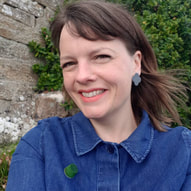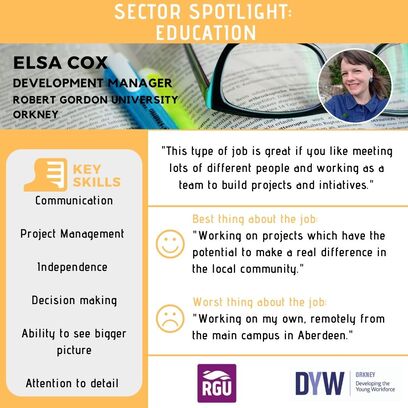 In our next Sector Spotlight on Education, we hear from Elsa Cox who is Orkney Development Manager for Robert Gordon University. Elsa studied Archaeology at Glasgow University before undertaking a Post Graduate Diploma in Museum and Gallery Studies at St Andrews University. She has worked in museums across Scotland, as well as in South Georgia, an island in the southern Atlantic Ocean. While not connected to her experience as a Curator, her current role combines many of the transferrable skills she has developed throughout her career so far.  Can you describe a typical day in your role as RGU Orkney Development Manager? I usually start at 8.30am and finish at 4.30pm, although this is quite flexible, and I can work from home or at the office at ORIC in Stromness. The day often starts with a review of email correspondence, followed by a daily virtual catch up with the team in Aberdeen to look at our priorities for the day or week ahead. Based at ORIC in Stromness, I act as the key point of contact for relationships between Robert Gordon University and Orkney which includes research, student and business activities. Some of my regular daily activities include setting up meetings with a wide range of people locally to better understand their needs and see how RGU can work together with them to respond to challenges and opportunities. I work closely with colleagues in Aberdeen in the development of research projects working with collaborators in Orkney. I often give presentations or arrange workshops to explore themes such as health and wellbeing, sustainable communities, or smart islands. I also manage two RGU research projects with international partners, this can involve setting up and chairing meetings, preparing and monitoring budgets, writing detailed reports, giving presentations and communicating with global partners. There is also the opportunity to travel to meet with partners around the world. How did you end up in this role? My career path is a bit of a roundabout journey. I grew up living next to Skara Brae and became fascinated by archaeology. When it came to applying for courses at university I initially applied for economics as it was my best subject at school, but at the last minute I changed my UCAS form to archaeology and went to the University of Glasgow where I did my MA (Hons). During this time I became interested in museum practice and went on to do a PGDip Museum & Gallery Studies at St. Andrews University. In the museum sector it was essential to be prepared to move around quite a bit to progress, jobs were competitive and opportunities few and far between. I started as Assistant Keeper of Maritime History at Aberdeen Maritime Museum, before moving to National Museums Scotland as Assistant Curator of Science and Technology. I then took a chance on a six-month post as a Curator for the South Georgia Museum on the sub-Antarctic island of South Georgia and ended up doing this for five years. A life changing experience in an amazing environment. In order to progress further in a curatorial role I decided to undertake an MSc at the University of Edinburgh in Science and Technology studies, linking to my love of science and technology museum collections. Shortly after completion I became Curator of Technology at the National Museum in 2012 and progressed to Senior Curator. In my last few years at the museum I started to look for opportunities to move home to Orkney. We ended up spending my maternity leave in Orkney in 2017 and the position at RGU came up just at the end of this period. Although not directly linked to my career in museums, I found that I had several transferable skills of relevance for the role including project management, funding, education, remote and lone working and communication skills. I joined RGU in 2018. What is the best thing about your job? Working on projects which have the potential to make a real difference in the local community is really fulfilling. RGU has recently become a member of the University of the Arctic and I enjoy working with colleagues from all over the north exploring shared challenges and opportunities. I also really enjoy being able to work across all the different subject departments at the university. I could be working on an arts project one week, an architecture project then next, followed by health care or engineering for example. What is the worst thing about your job? I work on my own and remote from the main campus in Aberdeen. This means you must be particularly dedicated and motivated, but my day-to-day activities can be quite diverse, and I meet with lots of different people. Improvements in virtual technology also means I never feel that far from my colleagues in Aberdeen. What skills do you need to undertake your role?
What qualifications do you have?
Would you recommend this job to young people, if so why? Yes, this type of position is great if you like meeting lots of different people and working together as a team to build projects and initiatives. It changes all the time, there is always something new to explore, and you also have the opportunity to travel (in non-Covid circumstances). Visit RGU Orkney on: Website: https://www.rgu.ac.uk/research/rgu-orkney Facebook: https://www.facebook.com/RGUOrkney/ Twitter: https://twitter.com/RGUOrkney Comments are closed.
|
Archives
June 2024
Categories
All
|
 RSS Feed
RSS Feed